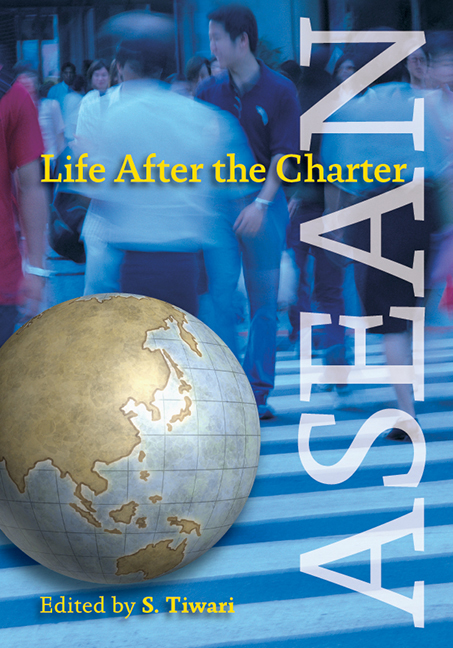Book contents
- Frontmatter
- Contents
- Foreword
- Preface
- List of Contributors
- Introduction
- 1 ASEAN Legal Personality under Its New Charter – Its Nature, Meaning and Implications: Status of the Work and Issues Involved
- 2 Does ASEAN Exist? The Association of Southeast Asian Nations as an International Legal Person
- 3 Life in ASEAN After the Entry into Force of the ASEAN Charter: Implications and Follow-ups
- 4 Translating the Design into a Bloc: The Domestic Implementation of the ASEAN Charter
- 5 ASEAN Trade in Goods Agreement (ATIGA)
- 6 The ASEAN Comprehensive Investment Agreement 2009: Its Objectives, Plans and Progress
- PRIVATE SECTOR PERSPECTIVES
- Index
1 - ASEAN Legal Personality under Its New Charter – Its Nature, Meaning and Implications: Status of the Work and Issues Involved
Published online by Cambridge University Press: 21 October 2015
- Frontmatter
- Contents
- Foreword
- Preface
- List of Contributors
- Introduction
- 1 ASEAN Legal Personality under Its New Charter – Its Nature, Meaning and Implications: Status of the Work and Issues Involved
- 2 Does ASEAN Exist? The Association of Southeast Asian Nations as an International Legal Person
- 3 Life in ASEAN After the Entry into Force of the ASEAN Charter: Implications and Follow-ups
- 4 Translating the Design into a Bloc: The Domestic Implementation of the ASEAN Charter
- 5 ASEAN Trade in Goods Agreement (ATIGA)
- 6 The ASEAN Comprehensive Investment Agreement 2009: Its Objectives, Plans and Progress
- PRIVATE SECTOR PERSPECTIVES
- Index
Summary
Legal personality is an attribute that is necessary in order for a person or entity to enter into legal relationships. Only legal persons can enjoy and enforce legal rights and obligations. In all national jurisdictions, whether or not a person or an entity is a legal person is determined by the domestic law of that jurisdiction. Internationally, this is determined by the rules of Public International Law. Legal personality of an entity is manifested in its capacity to sue or be sued in domestic or international courts and tribunals.
LEGAL PERSONS
Under the domestic laws of all nations, a legal person can either be a natural person, that is, an individual human being, or an artificial person. For a natural person, legal personality attaches at birth. Until birth, a person does not possess legal personality and thus cannot sue or be sued for matters occurring prior to his or her birth.
Artificial persons in domestic law are entities that are incorporated under domestic laws and conferred legal personality by law upon incorporation. Incorporation can be by registration, as in the case of companies. Alternatively, incorporation can be by statutes passed by Parliament. For example, in Singapore, statutory boards are all established by legislation which confers the body with legal personality and provides that it can sue and be sued. Historically, in some states, entities can also be incorporated by writs issued by the sovereign. Examples of these would be the many trading bodies during the heyday of European colonial expansion such as the Chartered Bank and the East India Company.
An artificial person is separate from a natural person or the entity involved in it. This means that the rights and liabilities of an artificial person are distinct from those of the natural person and entities, whether incorporated or not, who are its constituents.
- Type
- Chapter
- Information
- ASEANLife after the Charter, pp. 1 - 17Publisher: ISEAS–Yusof Ishak InstitutePrint publication year: 2010

